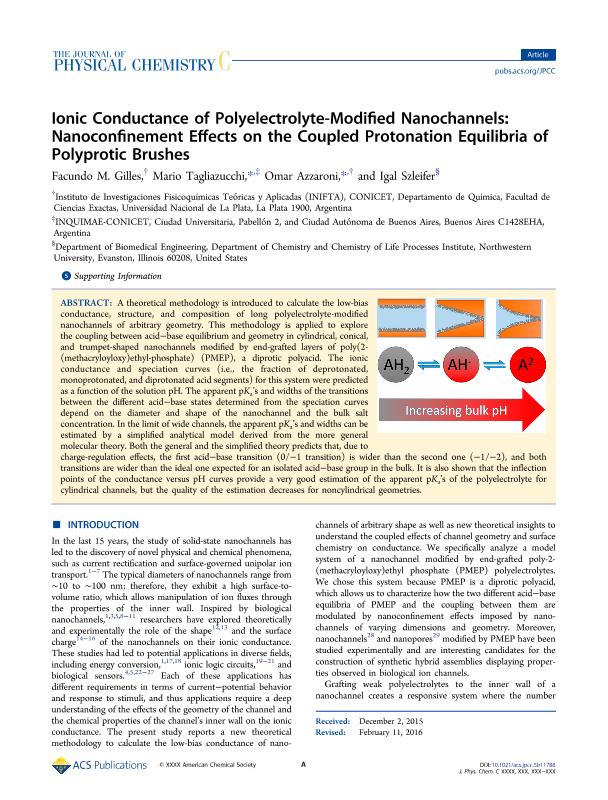Artículo
Ionic Conductance of Polyelectrolyte-Modified Nanochannels: Nanoconfinement Effects on the Coupled Protonation Equilibria of Polyprotic Brushes
Fecha de publicación:
03/2016
Editorial:
American Chemical Society
Revista:
Journal of Physical Chemistry C
ISSN:
1932-7447
Idioma:
Inglés
Tipo de recurso:
Artículo publicado
Clasificación temática:
Resumen
A theoretical methodology is introduced to calculate the low-bias conductance, structure, and composition of long polyelectrolyte-modified nanochannels of arbitrary geometry. This methodology is applied to explore the coupling between acid-base equilibrium and geometry in cylindrical, conical, and trumpet-shaped nanochannels modified by end-grafted layers of poly(2-(methacryloyloxy)ethyl-phosphate) (PMEP), a diprotic polyacid. The ionic conductance and speciation curves (i.e., the fraction of deprotonated, monoprotonated, and diprotonated acid segments) for this system were predicted as a function of the solution pH. The apparent pKa's and widths of the transitions between the different acid-base states determined from the speciation curves depend on the diameter and shape of the nanochannel and the bulk salt concentration. In the limit of wide channels, the apparent pKa's and widths can be estimated by a simplified analytical model derived from the more general molecular theory. Both the general and the simplified theory predicts that, due to charge-regulation effects, the first acid-base transition (0/-1 transition) is wider than the second one (-1/-2), and both transitions are wider than the ideal one expected for an isolated acid-base group in the bulk. It is also shown that the inflection points of the conductance versus pH curves provide a very good estimation of the apparent pKa's of the polyelectrolyte for cylindrical channels, but the quality of the estimation decreases for noncylindrical geometries.
Palabras clave:
Nanochannel
,
Nernst-Planck
,
Polyelectrolyte
Archivos asociados
Licencia
Identificadores
Colecciones
Articulos(INIFTA)
Articulos de INST.DE INV.FISICOQUIMICAS TEORICAS Y APLIC.
Articulos de INST.DE INV.FISICOQUIMICAS TEORICAS Y APLIC.
Articulos(INQUIMAE)
Articulos de INST.D/QUIM FIS D/L MATERIALES MEDIOAMB Y ENERGIA
Articulos de INST.D/QUIM FIS D/L MATERIALES MEDIOAMB Y ENERGIA
Citación
Gilles, Facundo Matias; Tagliazucchi, Mario Eugenio; Azzaroni, Omar; Szleifer, Igal; Ionic Conductance of Polyelectrolyte-Modified Nanochannels: Nanoconfinement Effects on the Coupled Protonation Equilibria of Polyprotic Brushes; American Chemical Society; Journal of Physical Chemistry C; 120; 9; 3-2016; 4789-4798
Compartir
Altmétricas




